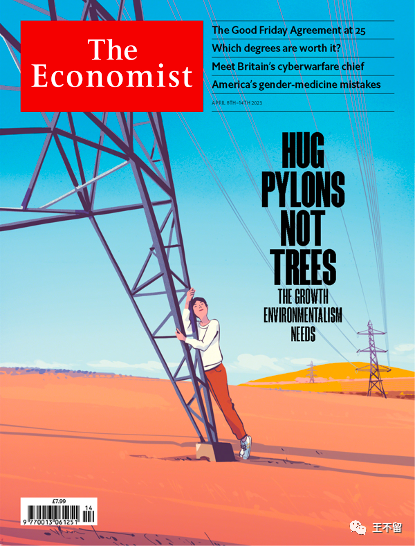
《经济学人》4月8日周报封面即社论区(Leaders)精选文章:《拥抱电网,而非树木》(Hug pylons, not trees)。

Hug pylons, not trees
拥抱电网,而非树木
The case for an environmentalism that builds
建设环保主义的理由
Economic growth should help, not hinder, the fight against climate change
经济增长应该有助于,而不是阻碍人们与气候变化作斗争

The sheer majesty of a five-megawatt wind turbine, its central support the height of a skyscraper, its airliner-wingspan rotors tilling the sky, is hard to deny. The solid-state remorselessness with which a field of solar panels sucks up sunshine offers less obvious inspiration, but can still stir awe in the aficionado. With the addition of some sheep safely grazing such a sight might even pass for pastoral. The sagging wires held aloft by charmless, skeletal pylons along which the electricity from such installations gets to the people who use it, by contrast, are for the most part truly unlovely. But loved they must be.
没有人会否认五兆瓦风力涡轮机的无比壮丽:它的中央支撑可以与摩天大楼比高,它的客机翼展般的旋翼划破苍穹。太阳能电池板吸收阳光的固态无情也不能给人带来多少显而易见的灵感,但是仍然可以激起爱好者的敬畏。再加上一些绵羊无忧无虑地吃着牧草,这一景象甚至可能被认为是田园牧歌。相比之下,下垂的电线被毫无魅力的如骨架般的高压线塔高高举起,从这些装置发出的电力沿着这些线塔到达用户手中,在大多数情况下确实没有什么可爱可言。但是,你一定要爱它们。
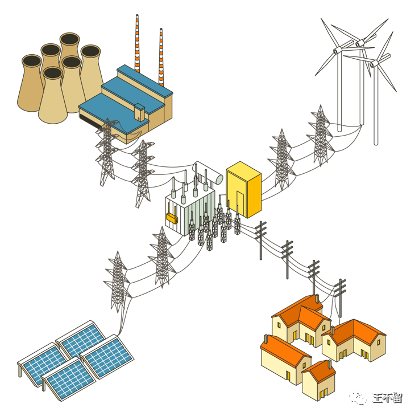
《经济学人》2023年4月5日文章配图:终极供应链——电网即将转型
If the world’s climate is to be stabilised, stopping electricity generation from producing fossil-fuel-derived emissions is crucial. So is greatly increasing the amount of electricity available. With more generating capacity, it will be possible to power motor vehicles and warm homes with electricity, rather than by burning dirty fuels. Expanding access to power for people in the poorest countries will reduce emissions from biomass burning and greatly improve living standards. More copious and reliable electricity will be needed for effective adaptation, too. If heatwaves are not to become ever more lethal, grids in developing countries will have to reliably power wider use of air conditioning in energy-hungry cities.
如果要稳定世界气候,至关重要的一点是要阻止发电产生化石燃料衍生的排放。因此,可用电量也大大增加。随着发电能力的提高,将有可能为机动车辆提供动力,并用电力取暖,而不是通过燃烧肮脏的燃料(如煤炭、石油等)。扩大最贫穷国家人民的电力供应,将减少生物质燃烧的排放,并大大提高生活水平。有效适应也需要更充足和更可靠的电力。即使热浪不会变得更加致命,发展中国家的电网也将不得不可靠地为能源匮乏的城市更广泛地使用空调提供动力。
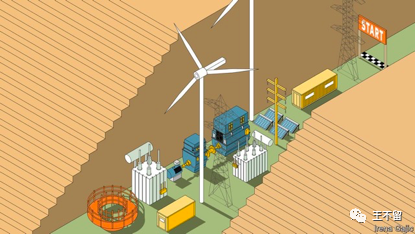
《经济学人》2023年4月5日文章配图:既要加快又要等待——电网扩容并非易事。如果电力来自可再生能源,则难上加难。

《经济学人》2023年4月2日文章配图:印度致命热浪的温度正变得越来越高——在印度恒河平原,气候变化所造成的后果是极其可怕的。
The trouble is that the scale of the changes needed to adapt the world’s electricity grids is vastly underappreciated. Too little investment is taking place. Planning rules get in the way. And, in a deep and damaging irony, some of the biggest advocates of slowing climate change do not accept the logic that to do so requires building more.
问题在于,适应世界电网所需要的变革规模被大大低估了。投资太少。计划规则成为障碍。而且,具有深刻而破坏性讽刺意味的是,一些减缓气候变化的最大倡导者,不接受这样做需要进行更多建设这一逻辑。
As our Technology Quarterly explains, expanding and greening the grid will be demanding—and phenomenally expensive. A recent report by the Energy Transitions Commission, a global group of experts, sees the split in costs between the new generating capacity needed for an ample supply of clean electricity and the distribution, transmission and storage systems needed to make that supply useful as a roughly 55:45 proposition. The 45% that goes on grids and storage comes to about $1.1trn a year between now and the middle of the century. For comparison, the International Energy Agency, an intergovernmental think-tank, reckons that worldwide spending on electric grids is currently around $260bn a year: far less than is needed and, tellingly, less than is invested in upstream oil and gas.
正如我们的《技术季刊》所解释的那样,扩大并绿化电网的要求以及成本都非常高。全球专家组“能源转型委员会”(Energy Transitions Commission)最近的一份报告认为,充足供应清洁电力所需的新发电能力与配电、传输和存储等使这些电力供应可用的系统之间的成本分摊大约为55:45(即发电与使电力可用两者的成本比例基本持平)。从现在到本世纪中叶,45%的电网和存储成本每年约为1.1万亿美元。相比之下,据政府间智库“国际能源署”(International Energy Agency,IEA)估计,目前全球电网支出每年约为2600亿美元——远远低于需求,而且明显低于上游石油和天然气的投资。

《经济学人》2023年4月5日文章配图:太阳不会永远照耀大地——在解决供需矛盾方面,新电网的难度更大。
In addition to investment in new projects, existing ones must be speeded up. Too many that need connections are delayed by red tape, as are vital new transmission lines. Reforms to planning rules must make it easier to build big and often unpopular bits of infrastructure.
除了对新项目的投资外,还必须加快现有项目。太多需要接入电网的人被繁文缛节所延迟,重要的新建输电线路也是如此。计划规则的改革必须使建设大型且往往不受欢迎的基础设施变得更加容易。
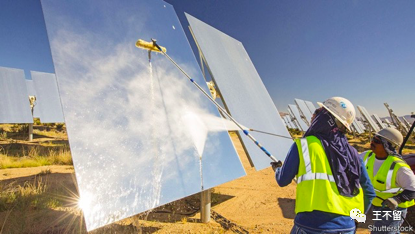
《经济学人》2023年4月5日文章配图:美国有望成为清洁能源超级大国——但是让国会通过最雄心勃勃的能源与气候法律并非易事。
If those plans are to work, and to do so legitimately, there also needs to be less objection to building in the first place. That would make timid politicians more comfortable with legislation designed to streamline things; it would hasten the arrival of essential new capacity; and, by reducing uncertainty, it would lower the cost of capital.
如果这些计划要奏效,并且合法行事,首先还需要减少对建设的反对。这将使胆怯的政治家对旨在简化手续的立法更加满意;这将加速必要的新产能的到来;而且,通过减少不确定性,它将降低资本成本。
One way forward is incentives. Modern grids allow for more local energy markets; they make it more feasible, say, to lower the cost of electricity to people who have a wind farm nearby, or whose land is needed for transmission lines. A scheme whereby some postcodes in England have lower electricity prices when the winds spinning a nearby turbine get stronger seems to have proved popular. Variable prices can both favour people near renewables and improve overall grid efficiency.
前进的途径之一是激励措施。现代电网允许更多的本地能源市场;譬如,对于附近有风电场的人或者土地被输电线路征用的人,降低他们的电力成本应该变得更加可行。当附近涡轮机旋转的风变强时,使英格兰的一些邮政编码(这些地方的电力用户)享受较低电价的计划似乎很受欢迎。可变价格(浮动价格)既有利于可再生能源附近的人们,又可以提高整体电网效率。
The design of such incentives will be important. Research undertaken in Germany shows that when landowners get money but the community at large does not, opposition can increase. Even when everyone gets a share, enthusiasm may not follow; being offered money makes people worry about what, exactly, they are giving up. Other European studies show that clear communication about the decarbonisation a project is designed to bring about works in a way cash does not.
这种激励措施的设计将发挥重要作用。在德国进行的研究表明,当土地所有者得到钱而整个社区却没有时,反对意见就会增加。即使每个人都得到一份,热情也不一定随之而来;得到金钱,就会让人们担心他们到底放弃了什么。欧洲的其它研究表明,把某项目是为了实现减排这一设计初衷清楚地跟人们沟通,可以达到金钱无法实现的效果。
We had to loot the planet in order to save it
为了拯救地球,我们不得不对它进行掠夺(乍一看,这句话的逻辑有些讲不通哈,别急,咱接着往下读……)
That leads to the crux of the matter. The strongest objections to building are often lodged in the name of the environment, and by those keenest on a greener future. The skyline must be preserved, they might say, or the woodland is too ancient to fell, or the colony of terns too important in and of itself.
这就引出了问题的症结所在。对建设最强烈的反对意见往往是以环境的名义提出的,也是那些最热衷于绿色未来的人提出的。他们可能会说:天际线(就跟我们很在意“发际线”一样哈)必须得到保护,或者林地年代久远不能砍伐,或者燕鸥和它们的栖息地都太重要了。
But climate change is a problem of a different magnitude from almost all other environmental concerns, and of a different kind. That it was brought to the world’s attention mostly by the environmentally minded is to the movement’s credit. But it cannot be tackled merely with the values central to classical environmentalism. Those most anxious to achieve the energy transition must acknowledge that more building is the most practical course of action.
但是,气候变化是一个与几乎所有其它环境问题不同量级、而且是不同类型的问题。它之所以引起世界的关注,主要是由具有环保意识的人提出的,这是环保运动的功劳。但它不能仅仅用古典环保主义的核心价值观来解决。那些最急于实现能源转型的人必须承认,更多的建设是最实际的行动方案。
And it is economic growth that will make possible the building of new transmission lines, gigawatt-scale renewable power installations and, indeed, the mines from which the minerals these things need are sourced. To demonise it, as some environmentalists do, is to expose the world to more climate change, not less. Many environmentally minded politicians now boast of the “green jobs” that their policies will bring. Seeking extra jobs makes sense only in the context of the continued economic growth they make possible.
正是经济增长,使得新的输电线路、千兆瓦级的可再生能源装置以及这些东西所需矿物来源的矿山等的建设成为可能。像一些环保主义者所做的那样,将这一建设妖魔化,就是让世界面临更多的气候变化,而不是更少。许多具有环保意识的政治家现在吹嘘他们的政策将带来“绿色工作”。只有在它们能带来持续经济增长的背景下,寻求额外的工作才有意义。
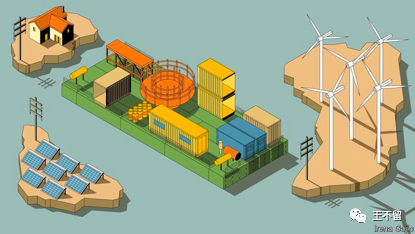
《经济学人》2023年4月5日文章配图:直接交付——由可再生能源提供电力的电网需要不同的管线,以及完全不同的转换系统
Those who believe there is no way to stop climate change through growth are fond of quoting Albert Einstein to the effect that “We cannot solve our problems with the same thinking we used when we created them.” This has two difficulties. One is that there is no evidence that Einstein actually said it. The second is that to change the way the world thinks, person by person, is a yet more ambitious task than changing the ways in which the world generates and distributes its electric power.
那些认为没有办法通过经济增长来阻止气候变化的人喜欢引用阿尔伯特·爱因斯坦的话:“我们不能用我们制造问题时所使用的相同思维来解决我们的问题”。这里有两个难点:一是没有证据表明爱因斯坦真的说过这句话(正如很多“子曰……”并非真的是孔子说的一样)。第二,逐一去改变世人的思维方式,与改变世界产生和分配电力的方式相比,是一项更加雄心勃勃的任务。
If the energy transition cannot be achieved with the habits of mind already available, it is hard to see that it can be achieved at all. For some of those who see themselves as green, that may be a counsel of despair. To those who want humans to flourish on a planet they can care for, the idea of an environmentalism that builds must be a call to action.
如果能量转型不能在已有的思维习惯下实现,那么就很难看到它得以实现。对于一些自认为是绿色环保的人来说,这可能是绝望的忠告(明知对你不起作用,但还是要告诉你)。对于那些希望人类能够在他们可以照顾的星球上蓬勃发展的人来说,建设环保主义的想法必须成为人们的行动号召。




















 780
780











 被折叠的 条评论
为什么被折叠?
被折叠的 条评论
为什么被折叠?








